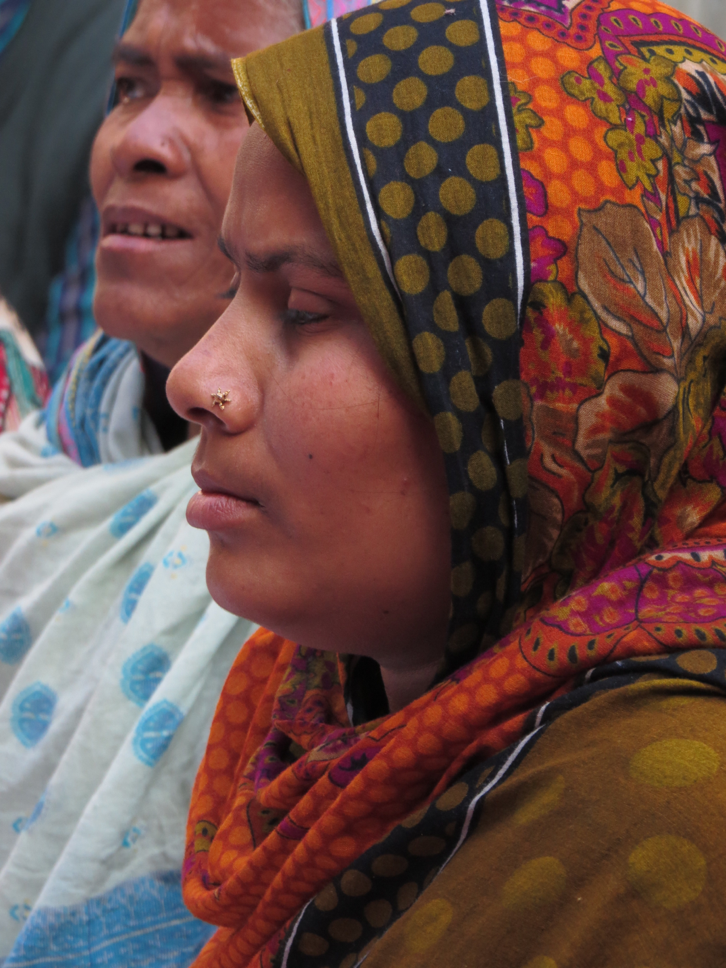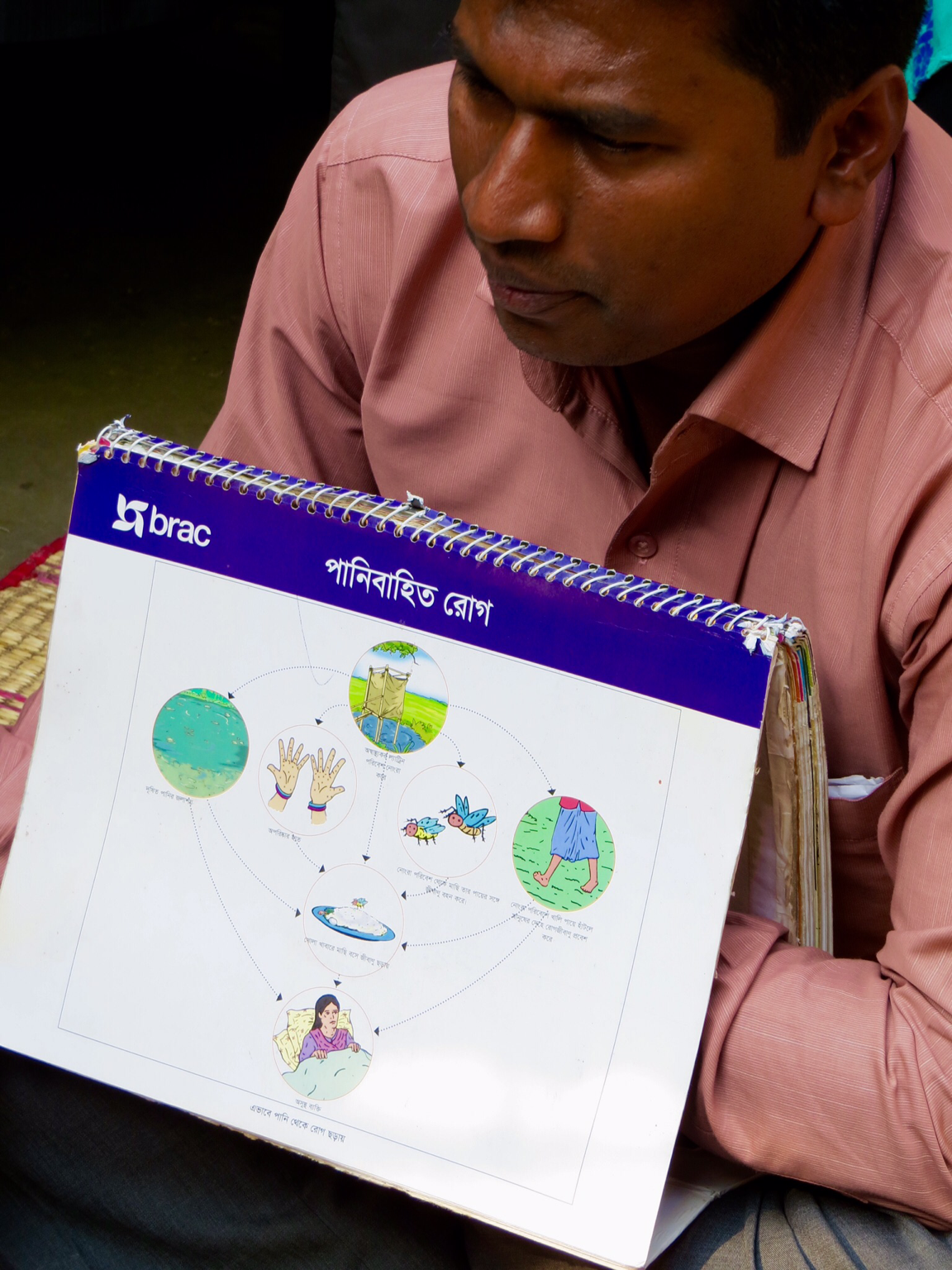Najmul Provides the Secret Ingredient
 Life Skills
Life Skills
Najmul guided his motorcycle along the path, passing the huts made of bamboo, straw and tin running along either side. He parked alongside one of the gathering of homes arranged in a square. Najmul climbed off his bike and walked into the extended family homestead, called a bari in Bangladesh. In the small clearing in the center sat 22 women, dressed in brightly colored saris. They stood to greet Najmul as he came in, and he responded with a greeting of his own.
“Let’s review our six social issues,” he said, as they all took their seats on a plastic mat, the women arranged in a semicircle around Najmul.
“No child marriage and don’t pay dowry,” said the women in unison. “Register all marriages. Prevent human trafficking. Report domestic violence. Be prepared for disasters. Keep children in school.”
“Very good,” said Najmul. “And the health issues?”
“Plan our families,” the women responded. “Eat healthy food every day and take vitamins. Wash our hands and utensils. Know how to deworm our children. Get immunized. Prevent chronic diseases.”
“You know them all,” exclaimed Najmul. “Now how about your savings. Do you all have savings deposits to make?” Najmul turned towards each woman and accepted her deposit. He wrote in her passbook the date and the amount of the deposit. He gave each woman a receipt that he and the woman both signed.
When he was done, Najmul pulled out a large presentation book. One side had pictures, the other side a narrative that explained the picture. Najmul held the book up for all to see. “Today we are going to review the lesson on avoiding water-borne diseases,” he said as he turned to the first page that showed insects and standing water around a picture of a woman. As he flipped through the book, Najmul explained how water-borne diseases spread, and how to they should wash their hands, plates, pots and utensils with clean water. He quizzed the women about when and how they should do this washing, and they all gave him the answers.
Monifa
At the end of the session, Najmul and the women all rose and said good bye. Najmul left with Monifa. He was going with her to check on her home and her business assets and answer any questions she might have. When they arrived at bari of Monifa’s husband’s family, Najmul asked to see her garden. Monifa took him to the side of the house where she was growing vegetables to use in the family meals. Then Najmul asked to see inside her house. Monifa stayed outside as Najmul looked in, checking on the cleanliness of the family living quarters, noticing the sewing machine and the scraps of cloth piled neatly beside it, making sure that the area where the cows slept had sufficient straw. Najmul came out, complimenting Monifa on her work. He asked to see her information book and made a few notes in it.
 Najmul asked about how Monifa’s daughter and two sons were doing in school. He asked especially about the youngest son, “He’s able to follow the lessons, even though he is blind?” Najmul asked.
Najmul asked about how Monifa’s daughter and two sons were doing in school. He asked especially about the youngest son, “He’s able to follow the lessons, even though he is blind?” Najmul asked.
“Oh yes, he loves to be in school,” Monifa replied. “He listens to everything that is going on and tells me about it when he comes home.”
“And the village poverty reduction committee, they’re still helping with his costs?”
“Yes, every month I get the money for my son’s supplies.”
“And what about your husband? How is his health? Is he able to work?”
“He’s still paralyzed on his whole right side. He looks for work, but no one wants to hire him.”
 Najmul then checked on the condition of Monifa’s cows and goats, asking about their immunizations. “And I saw the sewing machine in your home,” said Najmul. “It looks like you’ve been busy.”
Najmul then checked on the condition of Monifa’s cows and goats, asking about their immunizations. “And I saw the sewing machine in your home,” said Najmul. “It looks like you’ve been busy.”
Monifa smiled as she responded. “Yes, I have many people coming to me now asking me to make clothes for them. I learned a lot from that class run by the Mother Teresa charity that you recommended I attend. I always wanted to make clothes, but I never had any training until now.”
“I’m glad that is going well. You worked hard to get the money to buy the sewing machine. You sold a goat in order to buy it, right?”
“Yes, and I also used my savings. And my one cow has had a calf, so now I have two.”
Najmul reviewed Monifa’s income and expenses over the last two weeks, making some more notes in information book. He checked the part of the book where Monifa had marked on pictures to show what her family had to eat each day. He congratulated her again on her work and her thrift.
Najmul said good bye to Monifa and walked on to the next bari, where another participant waited to meet with him. Over the course of the day he would visit ten other women, in addition to Monifa.
Researchers from MIT and Yale have conducted randomized control tests on the graduation approach, both in Bangladesh and in replications of the approach in other countries. They published their findings in Science Magazine, and concluded that led to broad and lasting economic benefits, increased self-employment income, increased savings and increased confidence. They also found that participants continue to see growth in these areas years after they stop receiving support.
When I ask the researchers what they think the secret ingredient is that makes these programs successful, they all point to the coaching, the work that Najmul does when he visits each participant every week to check on their progress, offer advice, answer questions, and correct any misunderstandings.
The participants in these programs have well-honed survival skills that have enabled them to stay alive despite all the hardships and setbacks they have faced. But they will need a different set of skills to be able to manage assets, manage a cash flow that at times has surpluses, and adapt new practices that will keep their families and their livestock healthy and safe, and provide opportunities for their children that they never experienced for themselves. They will also need to gain confidence in trying these new things, someone to support them when they get it wrong, and help them to see ways to correct themselves. It is this regular interaction with someone who gets to know them well, providing encouragement and support, helping them see the path ahead, that allows these women to gain confidence in themselves, to begin imagining a different future, and to believe that they actually could accomplish some of their dreams.
Witness to a Tranformation
As he drove his motorcycle home, Najmul recalled what Monifa and her family had been like when she started the program a year ago. With her husband not able to work, and the family having no assets, Monifa could barely feed her children with the small amount she earned working in other peoples’ houses. In the hungry seasons she sometimes had to go to neighbors to ask for food.
Najmul thought about how Monifa looked today, managing her assets to build more business opportunities, creating a sewing business out of just a dream, the woven bamboo walls of her house replaced by tin, all her children in school, her husband receiving the medical attention he needed. A feeling of gratitude swept over him, that he had been able to witness such a transformation, and that he had played a small part in making it happen.
As you watch this video, listen to the women and how animated and quick they are as they respond. Remember that these are women who have grown up in ultra-poverty, and a year ago would have been much more comfortable being quiet and hidden. Now they take pride in showing off what they have learned.
 Life Skills
Life Skills